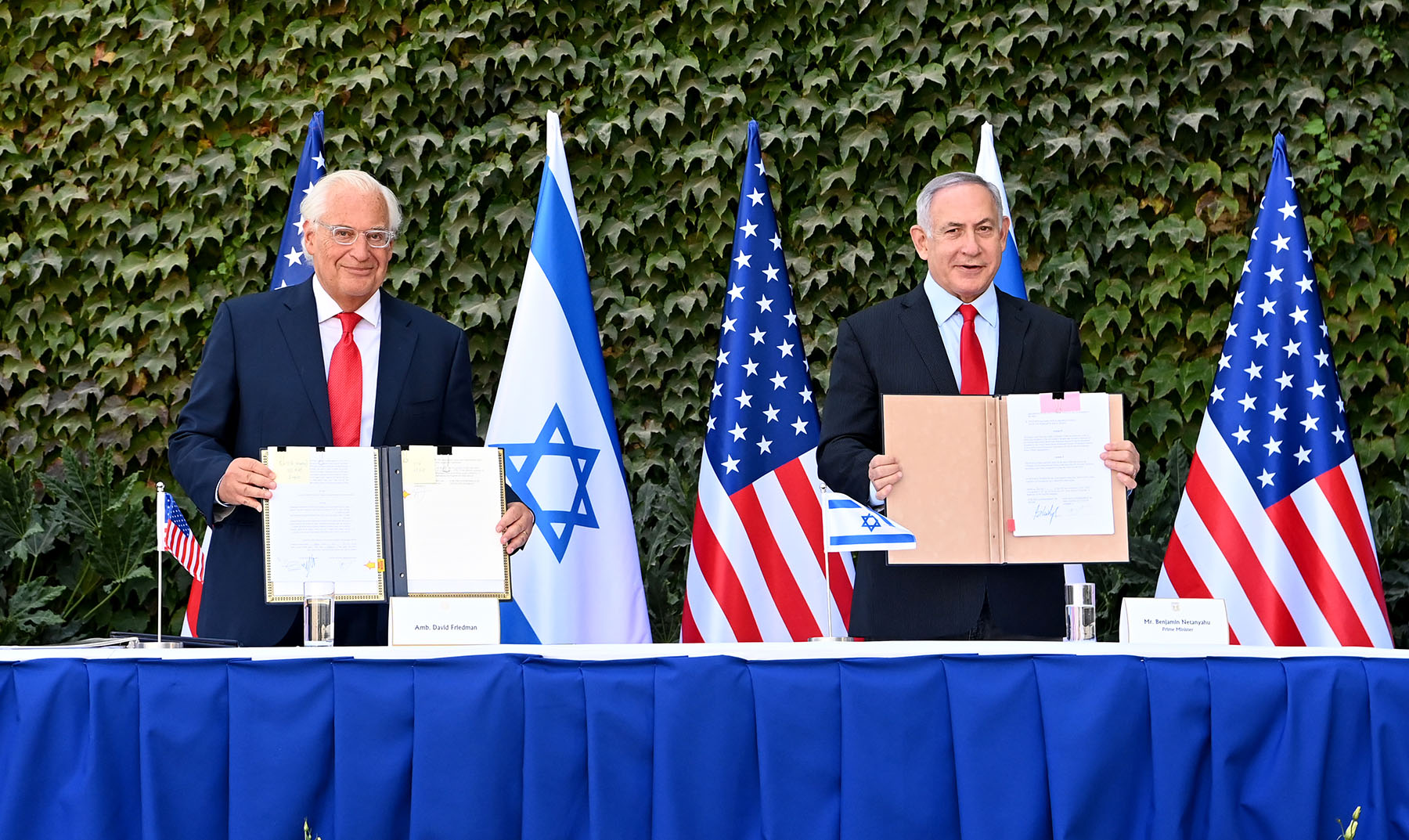 US Ambassador to Israel David Friedman (left) and Israeli Prime Minister Binyamin Netanyahu display freshly signed agreements to further binational scientific and technological cooperation on Wednesday during a ceremony at Ariel University on October 28. (Matty Stern/US Embassy Jerusalem)
US Ambassador to Israel David Friedman (left) and Israeli Prime Minister Binyamin Netanyahu display freshly signed agreements to further binational scientific and technological cooperation on Wednesday during a ceremony at Ariel University on October 28. (Matty Stern/US Embassy Jerusalem) THE MEDIA LINE — Israeli Prime Minister Binyamin Netanyahu and US Ambassador to Israel David Friedman signed an agreement on Wednesday to extend scientific cooperation to Israeli projects in the West Bank and Golan Heights, which the Jewish state conquered in the 1967 war.
The contract, which removes geographical limitations on joint US-Israeli research-and-development projects, marks a significant shift from Washington’s long-held policy of withholding taxpayers’ money from projects conducted on disputed land.
The signing ceremony occurred at Ariel University, in the West Bank settlement of Ariel.
“These geographic restrictions no longer comport with our foreign policy,” Friedman said in his opening remarks.
Since President Donald Trump’s administration no longer views Israeli settlements “as per se inconsistent with international law,” this decision is “righting an old wrong,” he said.
“We are depoliticizing a process that should never have been political in the first place,” he stated.
Netanyahu thanked the US government, saying the policy change marked an “important victory against all who seek to delegitimize everything Israeli” beyond the old pre-1967 border.
“By rejecting the failed mantras of the past, the Trump vision opens Judea and Samaria to academic, commercial and scientific engagement with the US,” he said, using the West Bank’s biblical names.
“To those malevolent boycotters,” he continued, “I have a simple message today: You are wrong and you will fail.”
The agreements modified on Wednesday concern three funds established after the 1967 war, when the US and Israeli governments opened formal ties in academic, research and technological cooperation regarding science, industry and agriculture.
The 1972 Binational Science Foundation, the 1976 Binational Industrial Research and Development foundation and the 1977 Binational Agricultural Research and Development Fund all contained – until Wednesday – language barring investments in institutions or research projects in the West Bank or Golan Heights.
“Until today, funds from the US government were shut off for Ariel University researchers; we just couldn’t apply for them,” its vice chairman and dean for research and development, Prof. Itzhaq Shai, told The Media Line.
“We’re talking about pretty big money,” he noted. “Entire labs can live off these grants, and researchers have built their entire academic careers with their help. This could be a real accelerator.”
Yet Shai also tempered expectations.
“It’s hard to say [what effect this will have]. They’ve only just been opened to us today, and not everyone who applies will receive grants. These are very competitive and prestigious foundations,” he explained.
“It might take some time, but our researchers will begin applying as soon as the next round opens this December,” he continued. “I hope some will win.”
Ariel University’s legitimacy has been controversial.
Because it is beyond the so-called Green Line – meaning in territory that is not under Israeli civilian law – the university was once considered separate from the rest of the country’s higher-education system. In the past few years, though, Netanyahu and successive education ministers have successfully fought Israel’s independent Council for Higher Education, which balked at providing funds and official recognition for the university out of fear of alienating European partners and global cooperation ventures.
“I’ve been [in Ariel] since 2012, and this subject of legitimacy and foreign grants has come up over and over again,” Shai said. “Our pressure on the decision-makers has been consistent, and today it paid off.”
Last year, Trump signed a proclamation recognizing Israeli sovereignty over the northern Golan Heights, and later declared that the US would no longer consider West Bank settlements to be in violation of international law.
The Palestinian Authority condemned Wednesday’s changes.
“Today’s event affirms that annexation is an ongoing process under full US support,” the PA’s Negotiations Affairs Department said in a statement.
“The international community has a responsibility… to exclude Israeli settlements from any deals with Israel…. We reiterate our call upon all educational institutions worldwide not to cooperate or engage with any Israeli institution operating in the occupied state of Palestine,” it added.
Osama Al-Qawasmi, a spokesperson for the Fatah movement, whose members include Palestinian Authority President Mahmoud Abbas, told The Media Line: “This agreement will contribute negatively to peace, will deepen the occupation and will damage the two-state solution.”
As such, he said, Fatah condemns these actions.
“The only way to achieve peace and security for all is the two-state solution, based on international law, equality and freedom for all,” Qawasmi added.
Nevertheless, many see Wednesday’s American gesture as a consolation prize from the Trump Administration to Netanyahu, who said he was postponing plans to annex parts of the West Bank in order to sign normalization accords with the United Arab Emirates and Bahrain.
In a sign of just how unhappy many settlers have become with the prime minister over this issue, the mayors of all Jewish townships in the West Bank boycotted Wednesday’s event.
Ever since Netanyahu announced that the annexation was being delayed to an unspecified date, local right-wing leaders have repeatedly accused him of betraying Jewish settlers.























 More news and opinions than at a Shabbat dinner, right in your inbox.
More news and opinions than at a Shabbat dinner, right in your inbox.